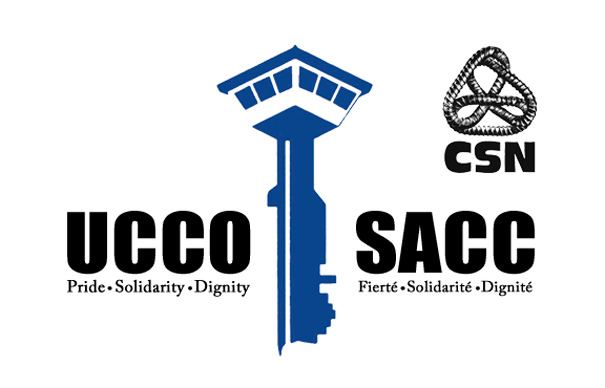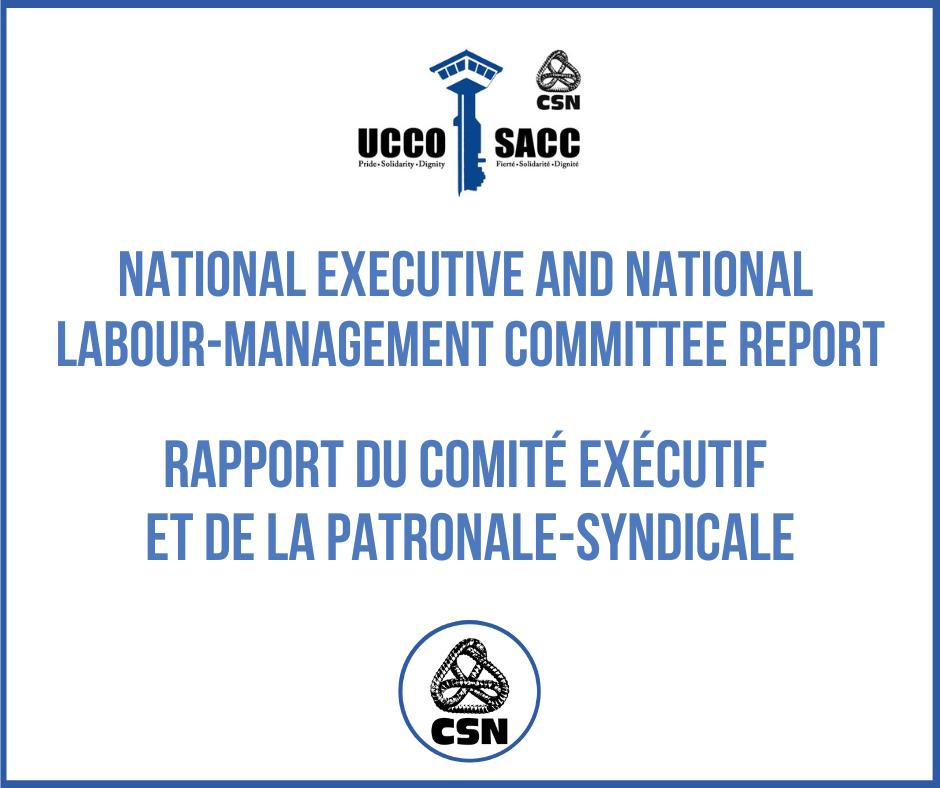UCCO-SACC-CSN National Labour-Management Update
The National Executive of UCCO-SACC-CSN met with CSC during the most recent National Labour-Management Committee. Below is a summary of the key discussions and issues raised on behalf of our members.
PNEP (Prison Needle Exchange Program) and Opiod therapy
The employer provided no new update on the PNEP, stating that the rollout remains stalled. They informed the Committee that Dr. Leonard has finalized a new report, which will be shared with the National Health and Safety Committee during the October quarterly meeting. The Executive Committee was concerned about the statement that sites would be re-evaluated for different consumption methods, as there is a trend towards smoking and snorting instead of injection. During the meeting with Health Services, the employer reaffirmed its commitment to transition from Suboxone, and in some cases Methadone, to the monthly injectable Sublocade. This represents a major win for our union after years of persistent advocacy and highlighting the mounting pressures on daily operations. It is encouraging to see this concern finally being addressed.
Starting October 1st, sites should see some relief during morning medication routines as Sublocade becomes the new norm for opioid therapy.
Consultation Issues
The union emphasized the need to revisit a few outdated Memoranda of Understanding (MOU), many of which may no longer apply to today’s work environment. In addition, concerns were raised over CD566-13, specifically paragraph 14c. After the consultation process had concluded, CSC made an addition to the directive without proper input from UCCO-SACC-CSN.
We made it clear that this does not constitute meaningful consultation, especially given that correctional officers are the largest stakeholders affected. CSC admitted that such additions should not “slip in” after the fact and agreed to review the situation further. The employer explained that its intent was not to deploy DDH resources everywhere, but rather to align their use with emergency situations.
Return to Work and Direct Pay During Graduated RTW
The issue of direct pay while on a graduated return to work program was raised again. CSC claimed the matter had already been addressed at the regional level. The employer maintained that insurance providers play a central role in exposure therapy and that management would not expect employees to perform work-related duties during the process. Workers on a graduated RTW are considered supernumerary. In other words, they are additional staff, not performing full duties.
UCCO-SACC-CSN reminded CSC that in many cases, members are performing many of the duties of a correctional officer, and this gradual return to the workplace should be funded by the department, as it would give the added incentive for a full return to work given entitlements to other benefits in the workplace such as earning leave and premiums.
CX Boot Allowance
UCCO-SACC-CSN reminded CSC that the boot allowance agreement negotiated last year must be honoured. While a funding request was submitted, it currently remains on hold with all other requests. CSC indicated that more information may be available later this fall, but we remain firm that this commitment must be respected.
Government Expenditure Review
The government’s ongoing expenditure review was discussed. This process is considered a matter of cabinet confidence and is expected to progress further this fall. No decisions have been finalized.
UCCO-SACC-CSN raised concerns about the lack of exemption for CSC, particularly when compared to other Public Safety groups. According to the Employer, while the RCMP and CBSA did receive exemption to the government’s drastic budget reduction exercise, they were also required to implement new initiatives without further funding, making the situation less beneficial than it appears at first glance.
Deployment Issues
Concerns were raised about training requirements interfering with acting appointments. An example at Millhaven was given where an acting extension was denied because of a CPR certification. CSC clarified that, in general, training is not a prerequisite for acting appointments or for deployments and committed to reviewing the matter we raised.
Pay Implementation and Retirees, WCB and Sunlife
Follow-up continues regarding pay implementation, retirees, and workers’ compensation. Sunlife is updated directly by Treasury Board, while CSC manually updates provincial WCB authorities on a case-by-case basis. CSC confirmed that Sunlife has now been updated with the correct pay rates.
CSC also informed the Committee that the files of retirees to whom retroactive payments from the latest collective agreement apply, have each been completed and payments issued.
Infrastructure
At Saskatchewan Penitentiary, the project concerning window coverings was discussed again. Conflicting information remains, and CSC has committed to following up regionally.
In Ontario, long-standing radio issues will finally be addressed, as boosters are scheduled for installation by 2026–2027. A contract with Motorola has been signed.
Schedules
Over the summer months, the subcommittee on schedules met with the employer on several occasions to go over the employer’s proposed changes to the Scheduling Bulletin, considering the changes in Appendix K of our latest Collective Agreement. You will recall that the agreement provides for the 12-hour type schedules to be comprised of a majority of 12,5-hour shifts and allows for five consecutive 12-hour type shifts. The documents will consist of a bulletin, a guidance document as well as another document on managing implemented schedules. The contents of the bulletin and of the guidance documents have been tentatively agreed upon, pending our agreement on the proposed translation into the other official language, the first version of which the Employer has not yet provided. The main objective for the union during this consultation process was to ensure the employer respected our rights under appendix K of our collective agreement as well as well-established practices and guidance always available for our Institutional Scheduling committees (ISCs). However, during this review, the Employer insisted on limiting the provisions of the bulletin which were previously more favourable to officers than those granted by the Collective Agreement. You may remember that the union successfully argued to maintain status quo on these provisions during the negotiation period. The legislated freeze period having elapsed, both our rights and obligations are determined by the Collective Agreement.
Throughout the consultation with the employer, the union has insisted on a joint training exercise with the employer to make sure each of our ISCs are equipped with the tools and resources to build the best schedules possible, and the Employer also expressed interest and willingness to go through this exercise. Last week, for the first time in our conversations, the employer refused to participate in joint training, a decision which represents a missed opportunity to demonstrate good faith from the onset of a challenging joint schedule review process, and to ensure common understanding of all aspects of joint scheduling. The union will organize an information and training session shortly, to ensure our side of the ISCs is equipped to meet with the employer, armed with the tools necessary to promote healthy work/home life balance by building the best schedules possible.
The National Executive of UCCO-SACC-CSN continues to challenge CSC on consultation, procedural fairness in the disciplinary process, and will continue to monitor any impact the expenditure review may have on our membership. We will keep you informed as the relevant files progress or are settled.
In Solidarity,
Your National Executive

